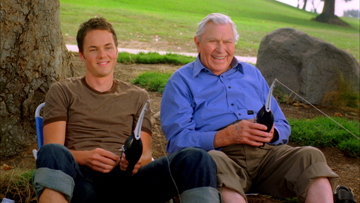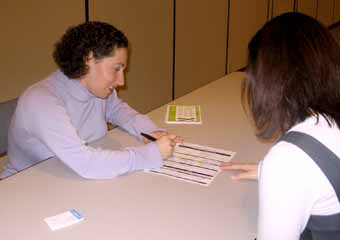Grandpa’s got game
Permanent link
Chicago native and filmmaker Marc Fienberg at the movies
Marc Fienberg always had a close friendship with his grandpa Joe.
Years after Joe lost his wife—Marc’s grandmother—of 54 years, Joe came to his grandson for advice on how to start dating again. Both men were living in Chicago at the time, Marc in Lincoln Park and his grandfather in a nearby retirement community. They would hang out with the ladies at Joe’s complex and Marc would offer his grandpa pointers.
Then, Marc’s advice paid off. “I kissed a woman last week,” Joe confided to his grandson. “Watching an 89-year-old man experience all the uncertainty, anxiety, and insecurity of a young schoolboy—when to call her, what to say, whether to ask her out—was moving and uplifting,” Marc recalls.
Grandpa Joe passed away three years ago, but Marc—a Jewish filmmaker originally from the Chicago area—keeps his memory alive in his new film, “Play The Game,” (Story Films) which hits Chicago-area theaters on Friday, Aug. 28. Written, directed, and produced by Marc, the movie is his first feature film, although he has produced short films in the past. Loosely based on Marc’s grandfather, the movie tells the story of David (Paul Campbell), who teaches his dating tricks to his lonely widowed grandfather Joe, played by Andy Griffith, who was Marc’s grandfather’s favorite actor.
At the same time, David tries to “play the game” and use his own dating techniques to attract Julie (Marla Sokoloff), the woman of his dreams. For David, the dating game fails, but the same tricks transform Grandpa Joe into the Don Juan of his retirement community. The movie also stars two famous TV moms, Doris Roberts, from “Everybody Loves Raymond,” and Liz Sheridan, from “Seinfeld.”
Chicago native and filmmaker Marc Fienberg at the movies
Marc—who grew up in Lincolnwood and Skokie and now lives in Los Angeles with his wife and four children all under age five—wasn’t always planning on a film career. In fact, he worked in the business world, most recently at an Internet start-up company in Los Angeles until two years ago. Then, he took what he recognizes as a risky leap into filmmaking. At the same time, he exercised his business acumen and connections from his business school, Northwestern University’s Kellogg School of Management, to raise money for the movie, which proved no easy task.
In addition to his business network, Marc used his connections in the Jewish world to get the film off the ground. He traveled around the country lecturing to Jewish organizations to spread the word about his film. The movie has, in particular, resonated with seniors. One such Florida senior, a 75-year-old woman named Florence, embraced the film so much that she spent three weeks visiting temples, retirement communities, and condos drumming up support for it. Marc credits Florence with drawing more than 3,000 people into theaters to see the film!
Returning home to Chicago in July to promote his movie, Marc spoke with Oy!Chicago about his grandpa Joe, switching careers, and playing the dating game.
In what way is Grandpa Joe in the movie based on your grandfather?
Some of the best lines and scenes [in the movie] came straight out of his mouth and life. He was living in Florida with my grandma and my grandmother died. Then, he came to Chicago so we could take care of him. For four years, he was down in the dumps, and then, overnight, he turned around and met a woman. He whispered to me, “I met a woman.” He started telling me the details. At first, I was a little bit “TMI.” But then I realized this was so nice to hear that an 89-year-old-guy can get back into it and can find literally a purpose for waking up in the morning. Think about it—you go from your only friend, your best friend, your wife—for 54 years and then overnight she’s gone and he realizes he doesn’t really have that many other friends, so you go from everything to nothing, and I could see how it sucks the life out of you. And then he had a reason to get back into it.

Paul Campbell (David) and Andy Griffith (Grandpa Joe) in “Play the Game”
How much of David, the ladies’ man in the movie, is based on you?
I would love to say, “I’m as suave and debonair as this ladies’ man.” The reality of it—as you can ask several women in the Chicagoland area that know me from my single days—is I was not as suave and debonair. I think the character is based more on the guy I hoped I could be one day. No, I was not quite the ladies’ man, but my friends and I did try all those tricks. They worked for my friends, just not for me.
There was a woman I dated in college that broke up with me, who I never stopped thinking about. I would constantly call her. Four years later, I couldn’t stop thinking about her. I would come up with excuses to go meet her. I would make up stories why I ran into her and it never worked out. Finally, seven years later, I called her out of the blue and put it all on the line. I said I’m still thinking about you and I’m not making up excuses to see you. Let’s date again and, sure enough, that’s when it happened. We got engaged and married and have four kids now. I took one of the messages of the movie and it worked for me in my own life.
Do you recommend that single people ‘play the game?’
I leave that to the viewer of the movie. It’s definitely not the Hollywood ending that people would expect. It’s a romantic comedy, so you sort of have an idea of who is going to end up with whom, but you’re completely surprised as to how they end up together and what the message of the movie is. It was important for me not to have the typical Hollywood ending that says “Just be honest with one another and good things will happen.” That’s nice but we all know that’s not the way the world works. I wanted to be very true to life in the message and the theme of my movie.

Marla Sokoloff (Julie) and Paul Campbell (David) in “Play the Game”
Do these rules work on single Jews?
These rules are particularly effective with Jewish women and men because it plays on the stereotypical, but somewhat true Jewish stereotypes: We probably have a little more guilt and a little more neurosis than the average group of people.
How are you raising your children Jewishly?
I had a strong culturally Jewish upbringing. I’m actually raising my four children more religious than I was. They know more much more about Judaism at 5 years old than my wife knows today. We want to send them to a Jewish preschool.
Was making a career switch to showbiz worth it?
I sit in a movie theater with 350 strangers and listen to the first joke and hear exploding laughter and hear them affected by my film. We showed it in a retirement community, and were expecting 200 people, but got 3,500 people instead. Afterwards, a 92-year-old guy comes up to me and says, “This movie could have been made about me. I want to introduce you to my 87-year-old girlfriend. We’ve been dating for seven years. We go out dancing and this movie is about us. This has given me confidence…” That’s why I got into this business, what made it all worth it.






.jpg)



